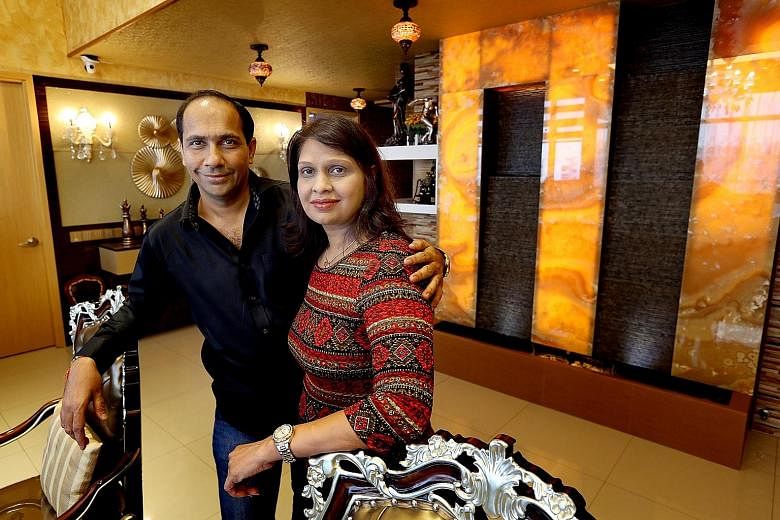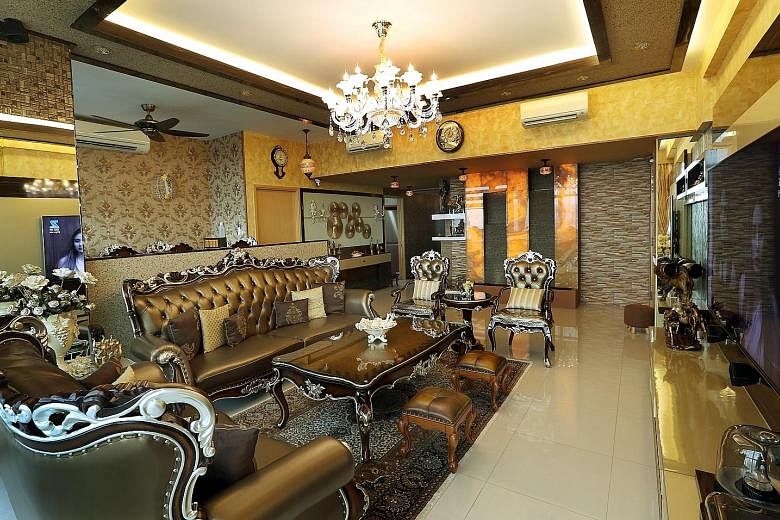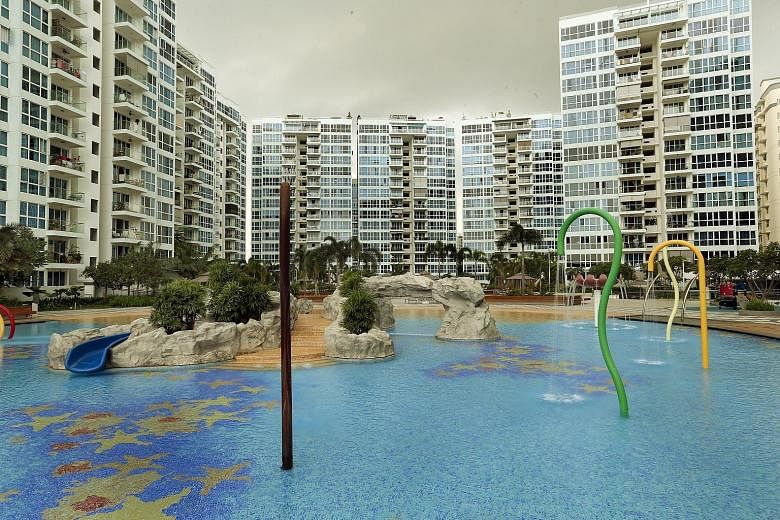When chartered accountant Rajesh Bafna, 46, moved here from Mumbai in 2001, he lived in rented homes for the first eight years before moving into his own condominium unit.
Back then, Mr Bafna, the chief executive of a company offering consultancy services, had neither knowledge nor understanding of property markets as he browsed the classified section of The Straits Times every Saturday.
He spent hours poring over property advertisements, identifying trends and studying the intricacies of the market before discovering that he had a natural savvy for spotting good buys at cheaper rates to sell for a profit.
With support from his wife Priti, 45, Mr Bafna, who is here on an employment pass, went on to make profits in his real estate dealings over the next 10 years, and managed to upgrade to bigger apartments.
This interest in property, he says, has now turned into such a passion that even though he has not entered the residential property market for quite some time now, he still follows the trends and market movements, and readily gives advice on real estate deals to those who ask for it.
Q Describe your property.
A It is a five-bedroom penthouse at Waterview condominium in Tampines. I bought the 3,778 sq ft apartment in January 2011 for $1.96 million, just hours before the new property measures were put in place by the Government. It comes with two roof terraces.
Of the five bedrooms, one is the master bedroom, one is my son's bedroom, two are guest bedrooms and one we have converted into a game room. A standard feature in other penthouses in the estate is a sixth bedroom, but I chose to convert it into a dining area.
One of the rooftop terraces has been converted into a lounge area, where we have a dining table and a pool table. It overlooks the pool and has a large tent for guests to sit in.
The other terrace is yet to be used. But I have a sauna and a shower installed there which will eventually be functional. A barbecue pit is also a possibility.
Including renovation costs, the price of the apartment may now have appreciated by at least $1 million.
Q Why did you choose this property?
A We had always wanted to move to a bigger home from our three-bedroom apartment in City Square Residences.
But there were other reasons as well, the most important being my 16-year-old son Devang's school. When the United World College of South East Asia set up a campus at Tampines, we decided to enrol him there. This condominium was in a convenient location.
Lastly, there was the price. We had already booked another smaller unit in this estate when my wife alerted me to this penthouse. It was bigger and, at $520 psf, I thought it was better value. And we really liked the place.
What expedited our decision was the Government's announcement to impose new regulations on property purchases in January 2011.
I remember rushing to the developer late in the evening, cancelling the previous deal, and making the down payment for the penthouse right away - just hours before the new curbs were to come into force past midnight.
Q What other properties are in your portfolio?
A We have lived in at least 14 homes since we came to Singapore in 2001, including rental homes.
The first one we bought was City Square Residences in 2006. It was a three-bedroom, 1,216 sq ft condominium bought at $666 psf costing $807,600. We sold it in 2010 after we upgraded to a better place.
That place was One Amber, which we bought in 2009. It was a three-bedroom, 1,335 sq ft freehold condo unit that cost $1.46 million. We lived there for three years before upgrading to Waterview. We sold it in 2013 for $2.02 million.
In between, I invested in four other properties. First was a two-bedroom condominium at One Saint Michael's, bought in 2007 for $715,000. I sold it two years later for $845,000.
Second was a four-bedroom condominium at Oasis@Elias, also bought as investment in partnership with a friend in May 2010 for $1.038 million. We sold it for $1.309 million in October 2011.
The third was a three-bedroom apartment at Cube 8, also bought as an investment with a friend in January 2010 for $1.66 million.
It fetched me a rental of $4,300 per month until it was sold for $1.88 million this year.
I also had another four-bedroom apartment in City Square Residences, bought for investment purposes and sold for a profit.
Besides this, I have two commercial properties in Singapore under a private company, two apartments in Melbourne, one apartment in London and three in Mumbai.
Q What is your financing strategy?
A For every apartment I bought, I borrowed from the banks. Interest rates were very competitive in Singapore until 2010, and there were no restrictions on loan amounts.
Each time, I paid 20 per cent from my own savings, and borrowed 80 per cent from lenders. I then waited for the market to peak for that particular property. Once I sold the property off, I used the amount - which included my down payment and profit - to invest in other properties which had the capacity to appreciate in value over a span of two to four years. In the meanwhile, our earnings were sufficient to pay off our monthly mortgages.
I have always worked with local banks like OCBC, DBS Bank and UOB. They have competitive rates, good service and no hidden costs. I find that although foreign banks may give good packages, when it comes to repricing, there are many hidden costs.
Q Describe your property investing strategy?
A My strategy is simple - when buying property, keep sentiment at bay.
Most people look for a good location when buying property. But they forget that the cost of a good location is always factored into the price. They also choose the "brand new" tag over old estates.
I look at the price, my cash flow and affordability. Smart buyers know that if the "new" tag is removed, they will find good properties at cheaper rates in the same location.
Besides, over the next decade, public transport connectivity in Singapore will be world-class, which means every property would be considered conveniently located.
Q What is your market view?
A The current market is not the right time to dabble in property. There are a few reasons for this. First is the stricter policies in place, as well as the Additional Buyer's Stamp Duty (ABSD), which is being slapped on certain types of buyers.
There is a wave of collective sales right now, but I have my doubts on investors' ability to make good money from them. Once the new condominiums are available, there has to be adequate demand.
Tighter hiring regulations in Singapore, an ageing local population and factors like ABSD, seller's stamp duty et cetera may hamper demand for these new estates in future. I haven't bought a single residential property since this penthouse. I think I will re-enter the market only when the ABSD is eliminated or reduced.
Q What's your overall investing strategy?
A I have always invested only in property.
Apart from that, I do not believe in any other type of investments.
Equity markets, I think, are the worst platforms because they are driven by sentiment, and any one person has the ability to crash the entire market.
Governments usually intervene only after the markets have crashed. Think 2008 Lehman Brothers crisis or the 1995 Harshad Mehta scam in India.
Q Your dream home is...
A Some day, I want to own a landed property, hopefully in Sentosa.




